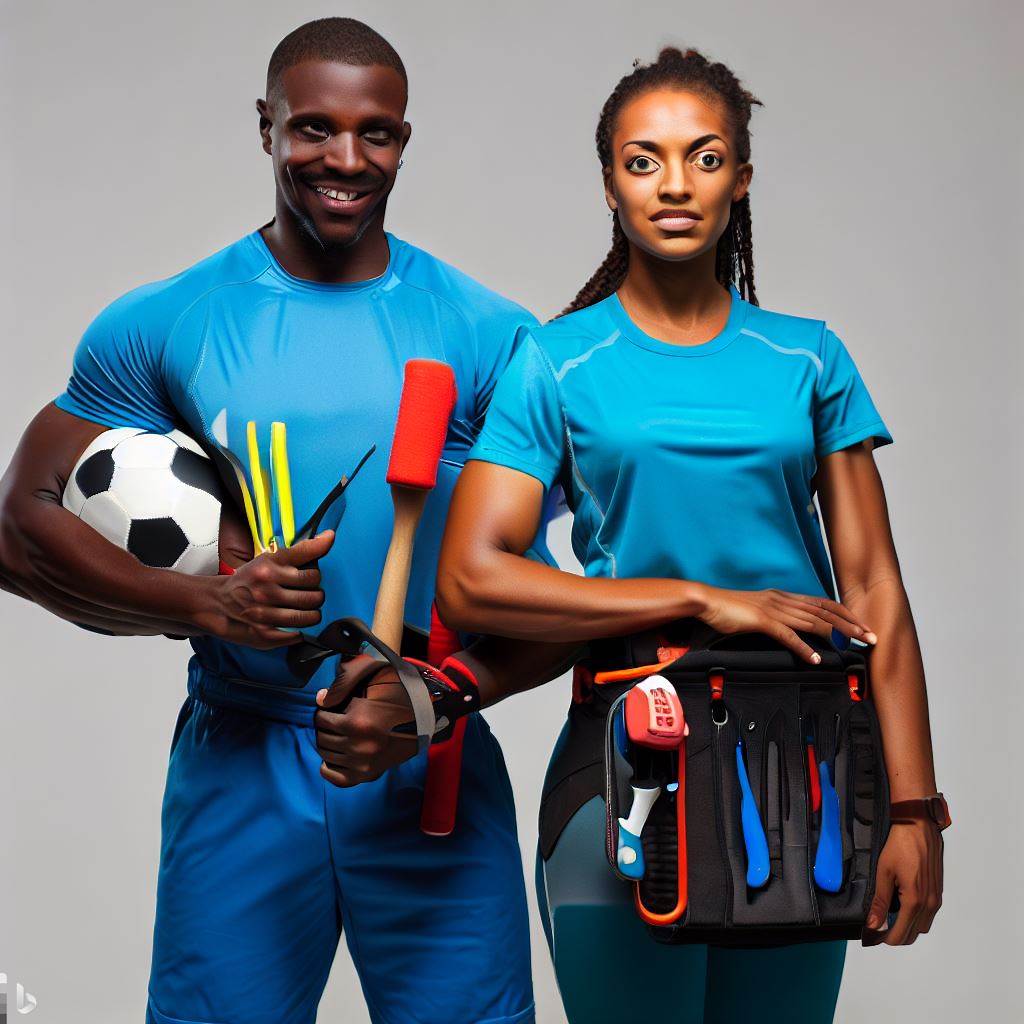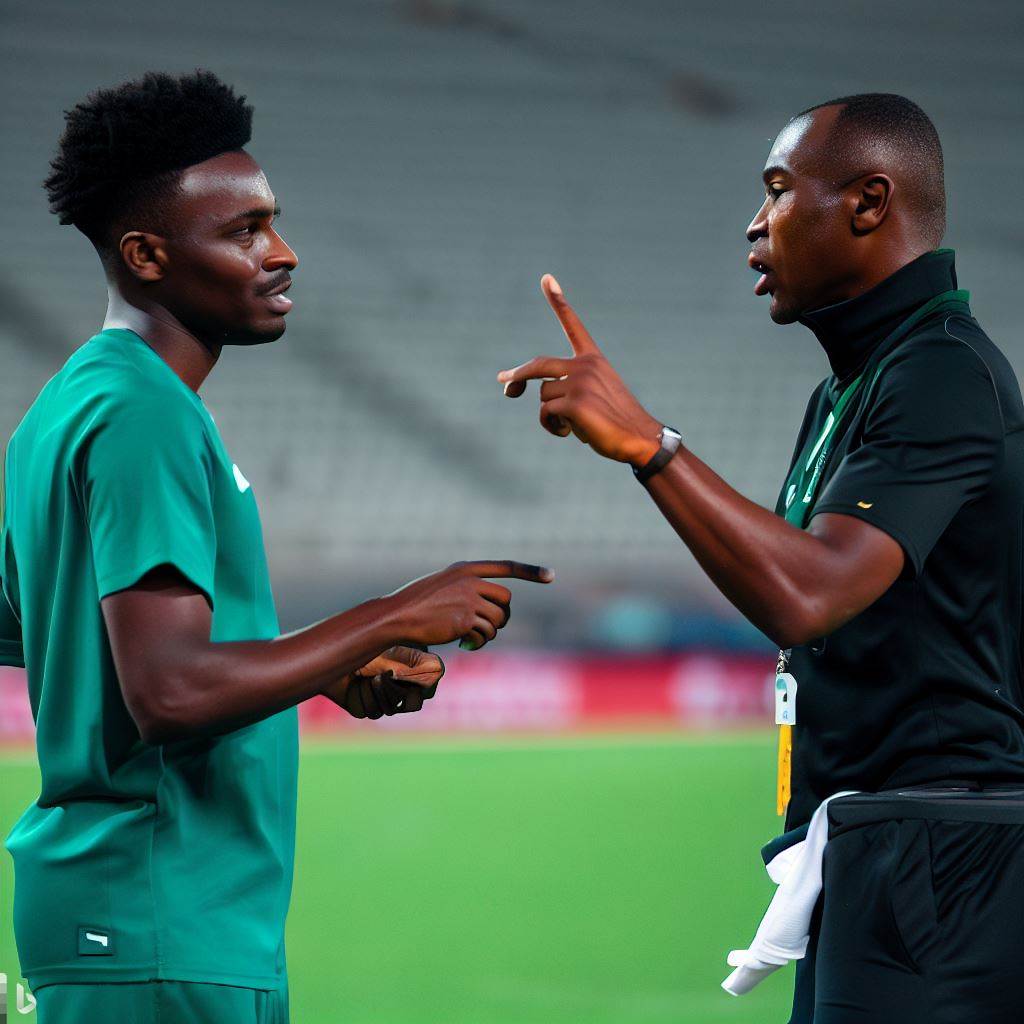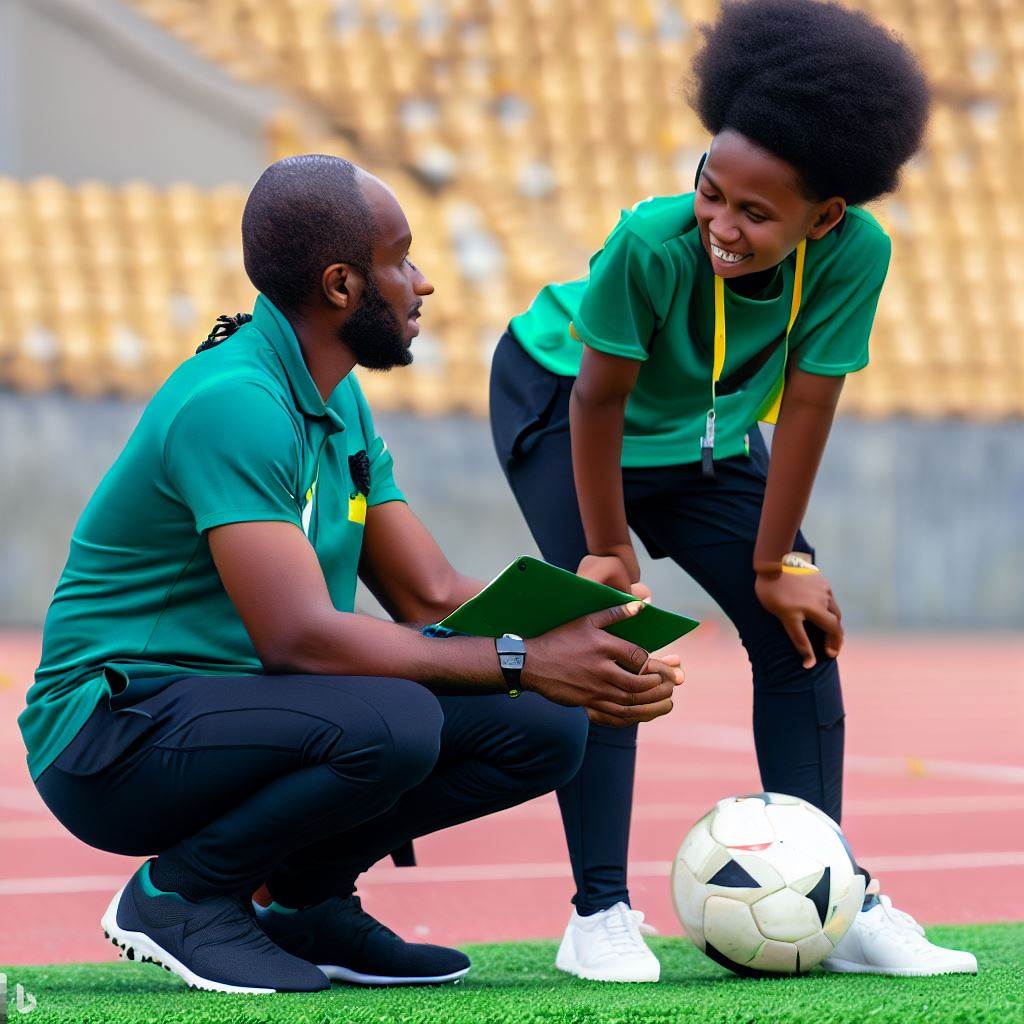Introduction
Athletic trainers in Nigeria play a crucial role in the field of sports medicine, ensuring the well-being of athletes. Tools are essential for them in their daily work, helping them diagnose and treat injuries efficiently.
A brief explanation of the role of athletic trainers in Nigeria
Athletic trainers in Nigeria are highly skilled healthcare professionals who specialize in preventing, diagnosing, and treating sports-related injuries.
They work closely with athletes, coaches, and medical teams to ensure optimal performance and recovery.
Overview of the importance of tools in the daily work of athletic trainers
Tools are indispensable for athletic trainers in Nigeria as they aid in various aspects of their work.
Equipment like thermometers, blood pressure monitors, and stethoscopes help them assess an athlete’s physical condition accurately.
Injuries are diagnosed promptly with the help of diagnostic tools such as X-ray machines and ultrasounds.
Furthermore, tools like taping materials, braces, and bandages assist athletic trainers in providing immediate first aid and stabilizing injured body parts.
Rehabilitation tools like resistance bands, balance boards, and weights are used to facilitate the recovery and strengthening of injured athletes.
In addition, technology plays a vital role in the daily work of athletic trainers. Software and applications help them record and analyze data, track progress, and design customized training programs.
They also utilize specialized tools for measuring body composition and performance metrics.
In summary, athletic trainers in Nigeria rely heavily on tools to fulfill their responsibilities effectively.
These tools enable them to provide timely and accurate medical assistance, support injury prevention, and facilitate the recovery of athletes, contributing to the overall success of sports in the country.
Essential Tools for Athletic Trainers
First Aid Kit
- A standard first aid kit should contain bandages, antiseptic solution, scissors, gloves, and more.
- Having a fully stocked first aid kit at all times is crucial for prompt and effective injury management.
Taping and Strapping Equipment
- Athletic trainers use various types of tape, such as adhesive, elastic, or kinesiology tape.
- Taping and strapping tools help prevent and treat injuries by providing support and stability.
Rehabilitation and Exercise Equipment
- Examples of rehabilitation equipment commonly used by athletic trainers include resistance bands and exercise balls.
- Having a range of exercise equipment aids in athletes’ recovery and helps improve their overall performance.
Measurement and Evaluation Tools
- Athletic trainers use tools like heart rate monitors and timing devices to assess athletes’ performance and progress.
- Accurate measurements are essential in tracking and improving athletes’ abilities for optimal training outcomes.
Read: Exploring Sports Medicine Opportunities in Nigeria
Challenges Faced by Athletic Trainers in Nigeria
Limited access to modern tools
- Lack of availability of specialized equipment.
- Financial constraints in acquiring necessary tools.
Athletic trainers in Nigeria face various challenges due to limited access to modern tools. One major obstacle they encounter is the lack of availability of specialized equipment.
Unlike their counterparts in more developed countries, Nigerian trainers often struggle to find the specific tools and equipment necessary for their profession.
Transform Your Career in Nigeria
Discover unmatched expertise with our personalized Career Consulting service. Navigate Nigeria’s job market with a strategy tailored just for you.
Get StartedThis scarcity makes it difficult for them to provide the high-quality care that athletes require.
In addition to the scarcity of specialized equipment, financial constraints also pose a significant challenge for athletic trainers in Nigeria.
Acquiring the necessary tools and equipment can be a costly endeavor, and many trainers simply lack the financial resources to invest in modern technologies.
As a result, they have to make do with outdated or suboptimal equipment, which hampers their ability to effectively diagnose and treat athletes.
Importance of resourcefulness and improvisation
- Examples of how trainers make use of locally available resources.
- How trainers adapt techniques and tools to the Nigerian context.
Despite the challenges they face, athletic trainers in Nigeria have demonstrated remarkable resourcefulness and improvisation.
They find innovative ways to make use of the limited resources available to them, showcasing their adaptability and dedication to their profession.
For instance, trainers often rely on locally available resources to substitute for specialized equipment.
They might use everyday materials such as resistance bands, sandbags, or even household items like bottles or buckets filled with sand or water.
These makeshift solutions allow trainers to deliver effective rehabilitation and conditioning programs without relying on expensive imported equipment.
Furthermore, trainers in Nigeria adapt techniques and tools to suit the Nigerian context.
They understand the unique challenges and cultural differences that impact their practice.
By incorporating local knowledge and traditions, they ensure that their interventions are culturally appropriate and resonate with the athletes they work with.
This resourcefulness and adaptability not only enable trainers to overcome the limitations imposed by their circumstances but also highlight their invaluable role in promoting sports medicine and athletic performance in Nigeria.
Despite the lack of access to modern tools, these trainers continue to make a significant impact on the development of sports and the well-being of Nigerian athletes.
Read: A Close Look at the Nigerian Professional Sports Infrastructure

Opportunities for Improvement
Education and Training
- Trainers need comprehensive knowledge of tools for effective performance.
- Training programs and workshops should be expanded to enhance trainers’ skills.
Collaboration with Organizations and Sponsors
- Building partnerships is crucial to secure necessary tools and funding.
- Engaging with companies and sponsors can help in obtaining equipment donations.
When it comes to the field of athletic training in Nigeria, there are numerous opportunities for improvement.
By focusing on education and training, and fostering collaboration with organizations and sponsors, the overall quality of athletic trainers in the country can be enhanced.
Education and Training
1. Importance of providing trainers with comprehensive knowledge of tools
Athletic trainers play a vital role in preventing and treating sports-related injuries. It is essential that trainers have a thorough understanding of the tools and techniques necessary for effective performance.
This includes knowledge of various rehabilitation equipment, taping methods, and first aid techniques.
By ensuring trainers are well-educated in these areas, the quality of care for athletes can be significantly improved.
2. Expansion of training programs and workshops
In order to further enhance the skills of athletic trainers, there is a need to expand training programs and workshops.
These programs can focus on advanced techniques and the latest advancements in sports medicine.
Additionally, providing opportunities for trainers to participate in workshops and conferences will allow them to stay updated with the latest research and best practices in the field.
By continuously improving their knowledge and skills, trainers can provide better care to athletes and contribute to their overall well-being.
Publish Your Professional Profile, Business or Brand
Showcase your expertise, gain trust, and boost visibility instantly on Professions.ng.
Publish NowCollaboration with Organizations and Sponsors
1. Building partnerships to secure necessary tools and funding
Athletic trainers often face challenges in acquiring the necessary tools and resources to effectively perform their duties.
This is where collaboration with organizations and sponsors becomes crucial.
By building partnerships with sporting associations, government bodies, and philanthropic organizations, trainers can secure the tools and funding they need to provide quality care.
These partnerships can also create opportunities for trainers to receive specialized training and certifications.
2. Engaging with companies and sponsors to provide equipment donations
Another way to improve the availability of tools for athletic trainers is through engaging with companies and sponsors. Many organizations are willing to support sports-related initiatives by donating equipment and resources.
By establishing relationships with businesses and sponsors, trainers can tap into these resources and ensure they have access to the latest tools and technologies.
Additionally, such collaborations can lead to the development of sponsorship programs, scholarships, and internships, further boosting the development of athletic trainers in Nigeria.
In a nutshell, there are several opportunities for improvement in the field of athletic training in Nigeria.
By focusing on education and training, trainers can acquire comprehensive knowledge and skills. Collaboration with organizations and sponsors can help secure necessary tools and funding.
By addressing these areas, the quality of athletic trainers in Nigeria can be elevated, leading to better care for athletes and the continued growth of the sports industry in the country.
Read: Breaking Down Nigeria’s Athletics Training Systems
Success Stories
Highlighting successful athletic trainers in Nigeria
- Chika Onuoha, a dedicated athletic trainer, has made a significant impact in Nigeria’s sports community.
- Ada Okoro, with her expertise and determination, has successfully trained numerous athletes in Nigeria.
- Emeka Nwosu, a renowned athletic trainer, has helped Nigerian athletes achieve remarkable feats.
Showcasing examples of trainers overcoming tool-related challenges
- Despite the lack of advanced equipment, athletic trainers like Chika have successfully rehabilitated injured athletes.
- Ada faced limited access to cutting-edge technology but devised innovative ways to assess and treat sports injuries.
- Emeka’s resourcefulness in utilizing everyday items as tools has been instrumental in his training programs.
Empowering stories of trainers making a difference despite limited resources
Although athletic trainers in Nigeria often face resource constraints, their determination and passion enable them to create a lasting impact.
Their stories inspire both athletes and aspiring trainers to persevere and achieve greatness.
- Chika organized community programs to provide free training and education to aspiring young athletes.
- Ada’s commitment to promoting injury prevention techniques has significantly reduced the risk of sports-related injuries in Nigeria.
- Emeka’s expertise in manual therapy has helped athletes recover faster without relying on expensive equipment.
These trainers have become role models in Nigeria’s sports community, showing that success is not solely dependent on resources.
Their dedication, knowledge, and ability to adapt have made them pillars of support for Nigerian athletes.
Through their work, they have demonstrated that passion and determination can overcome any tool-related challenges.
They have proven that limited resources should not be a barrier to achieving excellence in sports.
Nigeria’s athletic trainers continue to inspire and uplift athletes, fostering a culture of resilience and perseverance.
As the story of these successful trainers spreads, more individuals are motivated to pursue a career in athletic training.
Their achievements highlight the importance of investing in sports education, facilities, and resources.
By recognizing and supporting the efforts of Nigerian athletic trainers, the nation can unlock its full sporting potential.
These success stories pave the way for a brighter future and a thriving sports community in Nigeria.
In general, the success stories of athletic trainers in Nigeria demonstrate the power of passion, knowledge, and determination.
Despite the challenges they face, these trainers continue to make a difference in the lives of athletes and communities.
Through their resourcefulness and resilience, they inspire others and contribute to the growth of sports in Nigeria.
Read: How to Succeed in the Nigerian Professional Sports Scene
Conclusion
Athletic trainers in Nigeria play a crucial role in the health and well-being of athletes. The use of proper tools is essential in their work, as it allows them to accurately assess and treat injuries.
Investment in providing trainers with necessary tools is vital to ensure that they can perform their duties effectively. Without the proper equipment, trainers may not be able to provide the level of care that athletes need.
In conclusion, the dedication and resourcefulness of athletic trainers in Nigeria should be commended. They work diligently with the limited resources they have and strive to provide the best care possible for athletes.
However, it is important to recognize the need for further support and investment in providing trainers with the necessary tools.
This will enable them to continue their important work and ensure the well-being of athletes in Nigeria.




